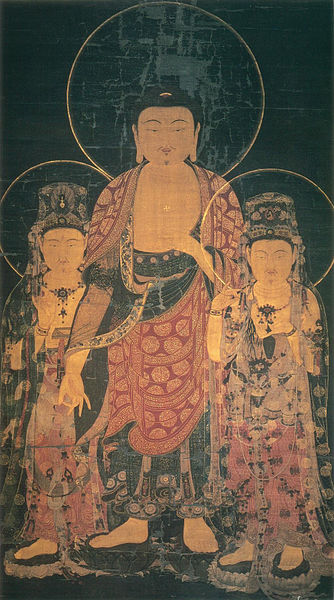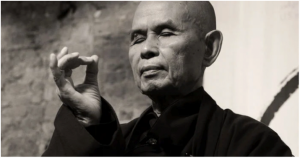
What is next after we place our faith in Amitabha’s deliverance?
One is considered to have established the two kinds of deep faith when one is earnest in one’s aspiration to be reborn in the Land of Bliss upon hearing the teaching of Amitabha’s deliverance, as mentioned in my previous articles on this website.
Faith is the first step in entering the gateway to Pure Land Buddhism, but it is not the end of the Pure Land path to Buddhahood. Like many other religions Pure Land Buddhism teaches various practices, beginning with the Five Primary Practices,* as stipulated by the de facto founder of the Pure Land school, Master Shandao. Master Shandao reiterates that the primary practice of reciting Amitabha’s name assures rebirth in the Pure Land, in accordance with Amitabha’s Fundamental Vow (the 18th Vow). In other words, exclusive Amitabha-recitation is the only practice we need to do to be reborn in the Land of Bliss, as guaranteed by Amitabha Buddha.
Between faith and practice
All the masters emphasize the importance of faith in Pure Land Buddhism. In Master Shandao’s explication of the Three States of Mind in the Commentary on the Contemplation Sutra, he specifically addresses Buddhists who follow and practice
the Buddha Shakyamuni’s teachings on cultivating meditative and non-meditative virtues through reliance on self-power. In order to make it easier for them to switch to Amitabha Buddha’s teachings of Amitabha-recitation, thereby relying on other-power, they must first have the two kinds of deep faith and then sincerely dedicate their previous karma-generating practices and aspire to be reborn in the Land of Bliss, and more importantly, begin reciting Amitabha’s name.
Nevertheless, during their practice of Amitabha-recitation, some people may ask, “Do I have faith now? Is my faith deep enough?” Some may worry and say, “My mind is not concentrated in Amitabha-recitation. I have many ambivalent feelings and doubts. I feel I lack faith. Should I read more sutras about Pure Land and Amitabha Buddha in order to gain deeper understanding? Can I be reborn in the Land of Bliss when the time comes?”
These are common problems for many Pure Land practitioners. They begin the practice of Amitabha-recitation with faith in Amitabha Buddha’s deliverance, but they do not know that faith is simply an expedient means to lead them to recite Amitabha’s name. The Bodhisattva Nagarjuna, considered the founder of the Pure Land school of Buddhism in India, said in the chapter on the Path of Easy Practice in his Discourse on the Ten Stages: “There are infinite doors to Buddhism, some difficult and some easy, just like practicing the worldly virtues. It is laborious if we walk on land, but joyful if we sail in a boat. This applies to the bodhisattva paths too. Probably, some are diligent in practice that requires effort, and some are leisurely in practice that requires faith as an expedient means, so as to reach the state of Avinivartaniya (non-retrogression) quickly.”**
If faith is just an expedient means leading us to be reborn in the Land of Bliss, what is the real and ultimate cause of this rebirth? When Nagarjuna founded the Pure Land school and classified it as the Path of Easy Practice, he stated, “Amitabha Buddha’s Fundamental Vow is like this: if someone recites my name and takes Refuge in me, this person at once attains the karma of assurance and will achieve supreme enlightenment (Anuttara-samyak-sambodhi). One should therefore recite it often.”** The recitation of Amitabha’s name is the assured karmic and direct cause of rebirth in the Pure Land, because it accords with Amitabha’s Fundamental Vow.
Master Shandao’s teachings on faith and practice
Ease and simplicity are the main characteristics of Pure Land Buddhism, which is a practice-oriented teaching as opposed to one based on theoretical knowledge or analytical understanding. Pure Land practitioners should believe in the Buddha through faith (or through Shakyamuni’s words) rather than through understanding.
Therefore, Pure Land practitioners need not ask “why,” “how,” “what,” and so on, or seek out the rationale or reasoning, but need simply to follow what the Buddha advises us to do. If they ask questions, it implies they have doubts, which may hinder them from following instructions on the practice, or even cause them to speak badly of the Dharma. One of the leading teachers of pristine Pure Land Buddhism, Master Jingzhong, advises us to abandon all questions, concerns, and doubts when we exclusively recite Amitabha’s name, the practice advocated by the Buddha Shakyamuni in the Three Pure Land Sutras.
Master Shandao introduces an important connection between faith and practice in Pure Land Buddhism, saying that faith is inherently reflected in our practice of Amitabha-recitation. As long as we recite Amitabha’s name, we will naturally have faith in Amitabha Buddha. Conversely, if we do not recite Amitabha’s name, we are considered not to have faith. Amitabha-recitation guarantees our rebirth, and is the only way to gain access to the Land of Bliss.
Faith Is Sustained Naturally through Amitabha-recitation
Master Honen, the de facto founder of the Pure Land school in Japan, said, “If one hears (of Pure Land Buddhism) but does not believe [in] it, it is regarded as not hearing [of] it at all. If one says he has faith (in Pure Land Buddhism) but [does] not recite Amitabha’s name, it is regarded as not having faith. Therefore, (we Pure Land practitioners) should always recite Amitabha’s name” (Honen, 288).
Being pristine Pure Land practitioners who have faith in Amitabha’s deliverance, we should not worry about anything, such as whether we have faith or doubts, whether we are good or evil, or whether we will be reborn sooner or later, but should just exclusively recite Amitabha’s name for the rest of our lives. This is what Amitabha’s Fundamental Vow says.
*The Five Primary Practices: Recitation of Scriptures, Reflection, Reverential Acts, Name-recitation, and Praise and Offering
**Translations by the author
References
Honen. The Full Collection of the Writings of Master Honen. Edited by Master Hujing. Taiwan: Pure Land Education Foundation.











